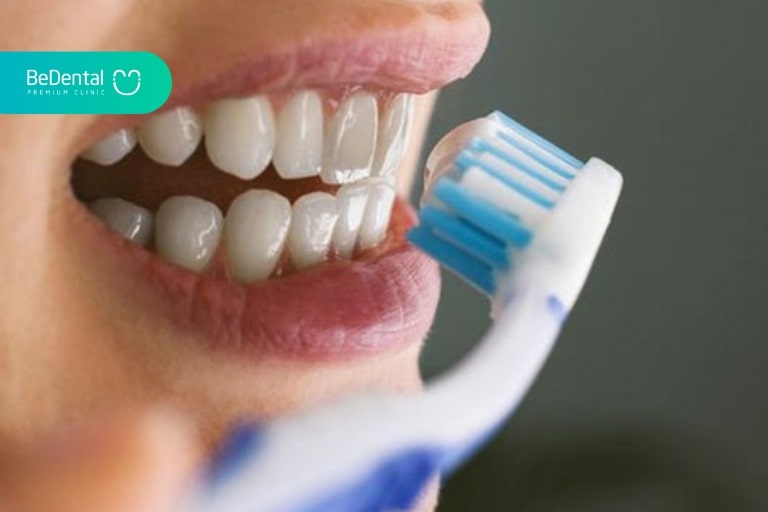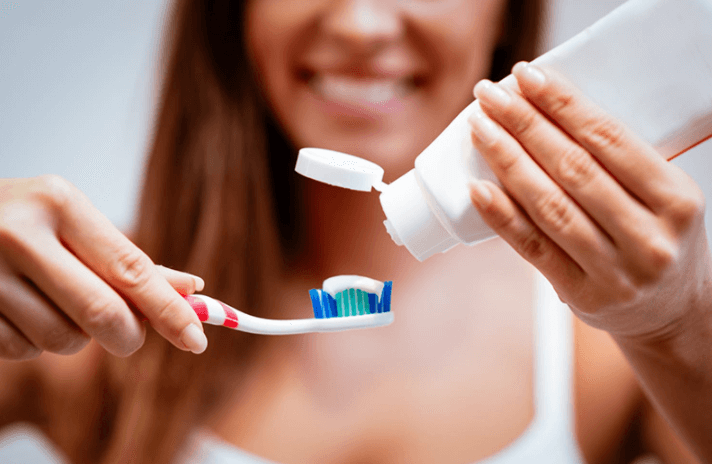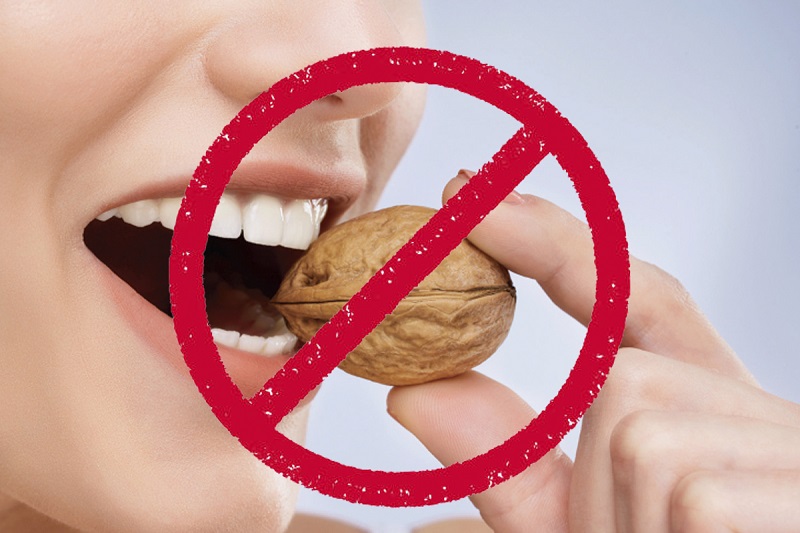After dental fillings are performed, most people are afraid that the fillings will fall off or become misaligned. Although we know that today’s modern technology helps greatly improve the lifespan of fillings compared to traditional techniques, the problem is Should you brush your teeth after fillings?. So, is it true that Should you brush your teeth after fillings? What should you pay attention to after dental fillings so that the fillings are not affected? Let’s find answers to these questions with BeDental’s team of dental experts.
Should you brush your teeth after fillings?
Should you brush your teeth after fillings? If you encounter tooth decay, chips, cracks, gaps, etc, you can choose tooth filling for aesthetic restoration. It is known that in the above cases, teeth defects will be almost completely fixed. Besides, dental fillings also ensure health safety, are non-toxic and non-invasive, so they can protect real teeth to the maximum.
However, after the dental filling was done, there was a problem. Should you brush your teeth after fillings? is always a question for many of you. We all know that brushing our teeth every day is the best way to clean bacteria. However, after filling your teeth, many people are still worried that the filling has not yet had time to harden and stabilize completely. Most likely, the impact of the toothbrush will cause the filling to dislodge, and you may face the risk of starting over again.

Should you brush your teeth after fillings? Experts say that whether you can brush your teeth right away or not will depend on the filling material. Because each dental filling material will have different degrees of hardness. Once it has hardened, the filling can bond tightly to the tooth surface. You can practice oral hygiene by brushing your teeth every day without fear of another problem occurring.
So to know exactly Should you brush your teeth after fillings?, please find out carefully what type of dental filling material you are using.
Can I brush my teeth after getting a tooth filling? Time you can brush your teeth after filling for each type of material
Experts have also explained that the time will depend on the dental filling material you choose. On the market today there are many dental fillings for you to choose from such as: composite, porcelain, silver, gold, GIC,…
The curing time of each dental filling is not the same. Some substances harden very quickly, others harden for a long time. Besides, with the support of technological machinery, it will also help change the hardening speed of dental filling materials.
So which dental filling materials can be used to brush teeth immediately after filling? The specific hardening time of each popular dental filling material today is as follows:
- Material hardening time of Composite tooth filling quite quickly, so usually after about 2 hours, you can proceed to brush your teeth gently.
- The hardening time for Amalgam dental filling material is relatively long. Therefore, usually after 24 hours you should brush your teeth. Remember to only use soft bristle brushes and brush gently.
- Ceramic filling material hardening time with technique Inlay Onlay dental filling very fast. With the help of a blue light laser, it will accelerate the hardening speed. You can brush your teeth right away without having to wait too long.
Note: You should comply with the time allowed for oral hygiene by brushing your teeth after filling.
Instructions for oral hygiene after dental fillings
Instructions for oral hygiene after dental fillings: Besides the questions Should you brush your teeth after fillings? If not, many people are interested in oral hygiene after dental fillings. Because if you fill your teeth with Amalgam, the hardening time will be quite long. You should also not leave your teeth uncleaned for more than a day.
So how to clean your teeth after dental fillings to ensure safety? BeDental will guide you on how to practice excellent oral hygiene and clean plaque without affecting fillings:
Choose a toothbrush with soft bristles
After filling a tooth, most people will experience teeth that become more sensitive. Therefore, brushing teeth with hard bristles can cause bleeding and scratches on the gums. Therefore, choosing a soft-bristled toothbrush that is suitable for the oral cavity is extremely necessary.
Besides toothbrushes, you should also choose toothpaste for sensitive teeth to clean your teeth during this time.

Brush your teeth properly
Brushing teeth properly is extremely important, not only after dental fillings. Following the correct procedure will help clean the oral cavity most thoroughly without causing any damage.
According to professional instructions, you should brush your teeth in a circular motion. Absolutely do not brush your teeth horizontally because this action will most likely wear down the tooth neck or affect the filling.
Electric toothbrush vs. manual toothbrush: What should I use?
Maintain the habit of rinsing your mouth with physiological saline
Using physiological saline to gargle is an extremely effective and benign hygiene method. You should maintain this habit every day, not necessarily only after filling your teeth. Physiological saline has extremely good bactericidal and disinfectant effects. Rinse your mouth with physiological saline after every meal to ensure your teeth are always completely clean.
Note: You should only use pre-mixed physiological saline with the allowed concentration. Absolutely do not mix salt water yourself because if the ratio is wrong, it can affect your gums.
Use dental floss to clean food stuck between teeth
Besides brushing your teeth and using physiological saline, you can buy additional dental floss for comprehensive oral hygiene. Often after each meal, food gets stuck between teeth and is difficult to remove. You can use dental floss to remove leftover food. This will help stop the risk of a strong outbreak of bacteria in the mouth.
What is the best thing to do after a tooth filling?
What is the best thing to do after a tooth filling? If you don’t know how to properly clean your teeth, in order for the filling to be durable and beautiful over a long period of use, you need to memorize the following do’s and don’ts after filling your teeth.

Take pain relievers prescribed by your doctor
In some cases, tooth filling is done on a tooth base with many serious diseases such as: root canal treatment, severe tooth decay with infection, abscesses, etc. If in this case the tooth filling can be performed, it is very likely, after completing the filling process, you will experience pain that will last for the first few days.
Therefore, if you have tooth pain or swelling, you should use pain relievers directly prescribed by your dentist. Absolutely do not change to another medication without your doctor’s opinion and approval to avoid harm to your health.
Note: If the pain lasts more than 4 days, you should go to a dentist for examination and treatment immediately.
Do not chew food on the side where the tooth has just been filled
Even though the filling has hardened, you should still avoid chewing food on the side of the tooth that was just treated. Because if you touch food that is too hard or too chewy, it can cause the filling to fall and move out of its original position.
Besides, avoiding chewing food next to the newly filled tooth will help reduce pain effectively. You should do this in about 1 week for the filling to completely stabilize. Then you can eat and drink as usual.
Choose foods that are soft and easy to swallow without requiring much chewing
The post-filling nutritional menu is also extremely important. The priority food group in the first days is to be as soft and liquid as possible to avoid chewing and creating impact on the surface of the filling.
So What to eat after tooth filling? Some recommended food groups to eat after tooth filling are:
- Nutritional porridge and soup: you should crush meat and vegetables to make the porridge and soup more nutritious. Eating porridge and soup will help supplement the body with essential vitamins and minerals without having to work with the chewing muscles.
- Milk: Prioritize milk lines supplemented with high calcium content. Calcium helps bones and is very beneficial for teeth.
- Fruit juice: instead of eating fruit and having to work your chewing jaw muscles, you can blend a smoothie and drink it every day to help increase your resistance.

Regularly check your bites
The filling is beautiful or not depends a lot on the doctor’s skill. Because if the level is poor and calculations are incorrect, it is likely to leave excess fillings on the teeth, creating a thick, uncomfortable feeling or distorting the bite when chewing.
Therefore, to avoid these situations, you can try biting your teeth together. If you see any unusual symptoms, go to your dentist immediately to have the filling reprocessed.
Memorize standard oral hygiene rules
Oral hygiene after dental fillings is an extremely important step in dental care. Please remember these 5 things when cleaning your teeth:
- Brush your teeth properly, at least twice a day to keep your teeth clean and prevent infection in the filling area.
- You should buy a small brush with soft bristles and only brush the table at a 45 degree angle. At the same time, avoid contact at the filling site and wait until the filling is stable.
- Prioritize choosing toothpaste containing fluoride to prevent tooth decay from appearing.
- Use physiological saline to rinse your mouth every day, especially after each meal.
- Use dental floss to clean between teeth.
Follow the regular follow-up schedule to check the condition of the filling
After filling your teeth, you should not be subjective but follow your doctor’s follow-up appointment to check your oral health and the condition of the filling. If you notice that the filling is dislodged, dislocated or broken, you need to treat it early to avoid more serious complications.
What not to do after teeth filling?
What not to do after teeth filling?- Avoid chewing food and drinking water for the first hour after dental filling
Chewing or biting food can cause damage to the filling, and in worse cases, it can break. Although some technologies and high-end dental filling materials may not require fasting, it is still best to avoid eating and drinking for about the first hour.
If you feel hungry, you can still eat soft foods such as porridge, soup, fruit juice, etc.
What not to do after teeth filling? – Hard, chewy and sticky foods should not be eaten
In the first days after filling, you should try to avoid eating hard, chewy foods. Because the chewing jaw is too active, it can cause the filling to be impacted and pulled out. For example, candy, dried nuts, sugar cane, chewing gum, beef jerky, etc. should be avoided for at least 1 week.

What not to do after teeth filling? – Avoid foods and drinks with high sugar and acidity content
Foods and drinks high in sugar and acid will increase the risk of dental diseases. In particular, in the case of tooth filling to treat cavities, consuming foods containing sugar will cause tooth decay to flare up. Over time, it causes the filling to break, chip, etc.
What not to do after teeth filling? – Do not use mouthwash and toothpaste containing alcohol
Mouthwash and toothpaste containing alcohol will reduce the durability of the filling. Therefore, you should avoid using it to help the filling stay beautiful and last longer.
What not to do after teeth filling? – Do not grind your teeth
Aside from the noted issueShould you brush your teeth after fillings? You also need to avoid the habit of grinding your teeth. This action can damage the fillings, causing them to crack or peel. If you have involuntary teeth grinding at night, you need to talk to your dentist so there can be tools to prevent teeth grinding from occurring.
How to Handle 3 Types Of Dental Emergencies While Working Abroad
The above article has helped you answer all your questionsShould you brush your teeth after fillings? Are not. At the same time, advise on how to care for teeth effectively and safely, helping to increase aesthetics and prolong the life of fillings. At BeDental, we apply safe, painless tooth filling technology with high-quality materials and affordable price. Contact now for more specific advice. Reference price list:
Danh mục Unit Giá thành
1.Teeth filling (More detail...)
Baby teeth filling 1 Unit 250.000
~ 10$
Permanent Teeth Filling 1 Unit 500.000
~ 20$
Cosmetic Filling1 Unit 700.000
~ 28$
Sensitive teeth filling1 Unit 500.000
~ 20$
Composite bonding 1 Unit 1.000.000
~ 40$
2.Root Canal Treatment - Anterior by endodontist machine (More detail...)
Root Canal Treatment - Anterior for baby teeth 1 Unit 1.200.000
~ 46$
Root Canal Treatment - Anterior for Front teeth 1 Unit 1.800.000
~ 60$
Root Canal Treatment - Anterior for Premolar teeth 1 Unit 2.500.000
~ 95$
Root Canal Treatment - Anterior for molar teeth 1 Unit 2.500.000
~ 95$
3.Root Canal reTreatment - Anterior by endodontist machine
Root Canal Treatment - Anterior for Front teeth by endodontist machine 1 Unit 2.000.000
~ 70$
Anterior for Premolar teeth by endodontist machine 1 Unit 2.500.000
~ 95$
Anterior for molar teeth by endodontist machine 1 Unit 3.000.000
~ 110$
4 Vecniflour dental care (More detail...)
Vecniflour dental care for child 1 Unit 500.000
~ 20$
Tư vấn chuyên môn bài viết:
BÁC SĨ VÕ HUY VI
BEDENTAL - TOP STANDARD DENTISTRY SYSTEM
In HANOI
Address 1: 7B Thi Sach St, Ngo Thi Nham, Hai Ba Trung Dist, Ha Noi. - 0934.61.9090
Address 2: No 129 Hoang Ngan, Yen Hoa, Cau Giay Dist, Ha Noi. - 0934.61.9090
In HO CHI MINH
Address 1: 53 -55 -57 Pho Duc Chinh St, Nguyen Thai Binh, Dist. 1, Ho Chi Minh. - 0766.00.8080
Working: 9am - 8pm everyday
Website: https://bedental.vn/en/
LEAVE YOUR INFORMATION IF YOU WANT MORE DENTAL CONSULTATION





